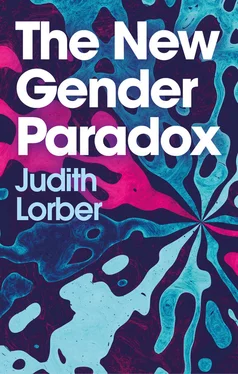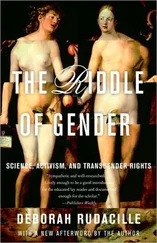1 Cover
2 Title Page The New Gender Paradox Fragmentation and Persistence of the Binary Judith Lorber polity
3 Copyright Page Copyright Page Copyright © Judith Lorber 2022 The right of Judith Lorber to be identified as Author of this Work has been asserted in accordance with the UK Copyright, Designs and Patents Act 1988. First published in 2022 by Polity Press Polity Press 65 Bridge Street Cambridge CB2 1UR, UK Polity Press 101 Station Landing Suite 300 Medford, MA 02155, USA All rights reserved. Except for the quotation of short passages for the purpose of criticism and review, no part of this publication may be reproduced, stored in a retrieval system or transmitted, in any form or by any means, electronic, mechanical, photocopying, recording or otherwise, without the prior permission of the publisher. ISBN-13: 978-1-5095-4435-6 ISBN-13: 978-1-5095-4436-3(pb) A catalogue record for this book is available from the British Library. Library of Congress Control Number: 2021938629 by Fakenham Prepress Solutions, Fakenham, Norfolk NR21 8NL The publisher has used its best endeavours to ensure that the URLs for external websites referred to in this book are correct and active at the time of going to press. However, the publisher has no responsibility for the websites and can make no guarantee that a site will remain live or that the content is or will remain appropriate. Every effort has been made to trace all copyright holders, but if any have been overlooked the publisher will be pleased to include any necessary credits in any subsequent reprint or edition. For further information on Polity, visit our website: politybooks.com
4 Acknowledgments Acknowledgments I want to thank Jonathan Skerrett, Polity editor, for suggesting this book. I’d also like to thank Susan Farrell, Kathleen Gerson, and Patricia Yancey Martin for their reviews at various stages and the anonymous reviewers of the first draft for their astute comments. Much of the book was written during the various levels of the COVID-19 lockdowns. That should have given me the gift of time, but anxiety over the pandemic often ate away at my ability to concentrate and write. I thank friends and East End Temple Sisterhood members for their psychological support. The inspiration for the book came from J. Lorber (2018), “Paradoxes of Gender Redux: Multiple Genders and the Persistence of the Binary,” in J. W. Messerschmidt, P. Y. Martin, M. A. Messner, and R. Connell (eds), Gender Reckonings: New Social Theory and Research , New York: New York University Press. Some material in the book is adapted from J. Lorber (2005), Breaking the Bowls: Degendering and Feminist Change , New York: W. W. Norton, and these articles and reviews: “Using Gender to Undo Gender: A Feminist Degendering Movement,” Feminist Theory 1 (2000): 101–18; “Constructing Gender: The Dancer and the Dance,” in J. A. Holstein and J. F. Gubrium (eds), Handbook of Constructionist Research , New York: Guilford Publications, (2008); “Review Essay: Gendered and Sexed Brains,”’ Contemporary Sociology 40 (2011): 405–9; “Review Essay: Why Do Bathrooms Matter?,” Contemporary Sociology 41 (2012): 598–602. New York March 31, 2021
5 Introduction Terms
6 1 How Gendered People, Organizations, and Societies Are Constructed Ethnomethodological insights into gender construction Doing gender Gender as performativity Constructing gendered structures Gender regimes Gender as a social institution Conclusion
7 2 Fragmentation of the Gender Binary Multiple genders Gender-neutral bathrooms Intersex identifiers Intersex athletes Menstruating and birthing men Battle of the pronouns Doing research without the gender binary Pros and cons of fragmenting the gender binary Conclusion
8 3 Persistence of the Gender Binary The myth of female and male brains Gendered research Standpoint theory Hegemonic masculinity and the “new” masculinities The #MeToo movement Gender-based violence Sexuality and the binary Transgender and the binary Pros and cons of binary persistence Conclusion
9 4 Why Haven’t We Had a Gender Revolution? The politics of identity Borderlands The politics of empowerment The gender frame Towards gender equality Producing gender-equal behavior Conclusion
10 References
11 Index
12 About the Author
13 End User License Agreement
1 Cover
2 Table of Contents
3 Begin Reading
1 iii
2 iv
3 vi
4 vii
5 viii
6 ix
7 x
8 xi
9 xii
10 1
11 2
12 3
13 4
14 5
15 6
16 7
17 8
18 9
19 10
20 11
21 12
22 13
23 14
24 15
25 16
26 17
27 18
28 19
29 20
30 21
31 22
32 23
33 24
34 25
35 26
36 27
37 28
38 29
39 30
40 31
41 32
42 33
43 34
44 35
45 36
46 37
47 38
48 39
49 40
50 41
51 42
52 43
53 44
54 45
55 46
56 47
57 48
58 49
59 50
60 51
61 52
62 53
63 54
64 55
65 56
66 57
67 58
68 59
69 60
70 61
71 62
72 63
73 64
74 65
75 66
76 67
77 68
78 69
79 70
80 71
81 72
82 73
83 74
84 75
85 76
86 77
87 78
88 79
89 80
90 81
91 82
92 83
93 84
94 85
95 86
96 87
97 88
98 89
99 90
100 91
101 92
102 93
103 94
104 95
105 96
106 97
107 98
108 99
109 100
110 101
111 102
112 103
113 104
114 105
115 106
116 107
117 108
118 109
119 110
120 111
121 112
122 113
123 114
124 115
The New Gender Paradox
Fragmentation and Persistence of the Binary
Judith Lorber
polity
Copyright © Judith Lorber 2022
The right of Judith Lorber to be identified as Author of this Work has been asserted in accordance with the UK Copyright, Designs and Patents Act 1988.
First published in 2022 by Polity Press
Polity Press
65 Bridge Street
Cambridge CB2 1UR, UK
Polity Press
101 Station Landing
Suite 300
Medford, MA 02155, USA
All rights reserved. Except for the quotation of short passages for the purpose of criticism and review, no part of this publication may be reproduced, stored in a retrieval system or transmitted, in any form or by any means, electronic, mechanical, photocopying, recording or otherwise, without the prior permission of the publisher.
ISBN-13: 978-1-5095-4435-6
ISBN-13: 978-1-5095-4436-3(pb)
A catalogue record for this book is available from the British Library.
Library of Congress Control Number: 2021938629
by Fakenham Prepress Solutions, Fakenham, Norfolk NR21 8NL
The publisher has used its best endeavours to ensure that the URLs for external websites referred to in this book are correct and active at the time of going to press. However, the publisher has no responsibility for the websites and can make no guarantee that a site will remain live or that the content is or will remain appropriate.
Every effort has been made to trace all copyright holders, but if any have been overlooked the publisher will be pleased to include any necessary credits in any subsequent reprint or edition.
For further information on Polity, visit our website: politybooks.com
Читать дальше












